Coptic Orthodox
"Your people shall be willing in the day of your power, in the beauties of holiness from the womb of the morning: you have the dew of your youth. The LORD has sworn, and will not relent, You are a priest for ever after the order of Melchizedek." (Ps 110:3)
His Holiness Pope Shenouda III was born, Nazeer Gayed, on August 3, 1923, from a religious family in the Upper Egyptian province of Assyut. Since his very early childhood, Nazeer Gayeed was an active participant in the service of the church. At age 16, Nazeer began service in the Sunday School program of St. Anthony's Church in Shoubra, Cairo, where he also attended school. Nazeer graduated from Cairo University in 1947 with a Bachelor of Arts degree in English and History. Nazeer then completed his Bachelors of Coptic Theology and upon his graduation from the Theological Seminary, was appointed a Seminary instructor of the Old and New Testaments due to his academic excellence in religious studies. In l953, he was appointed a lecturer at the Monastic College in Helwan.
On July 18, 1954 Nazeer Gayed dedicated his life to meditation, prayer, and asceticism entering into the El-Souryan Monastery within the Western Desert of the Coptic homeland of Egypt. His name would become Father Antonius El-Souryan and his solitary life would become one patterned after St. Anthony the Great who renounced the world and resided further and further into the arid, dry western desert, whose self-discipline and spiritual life grew from within a cave during his lifetime and today whose cave and life is ascribed to by religious scholars world wide, as the origin of Christian monasticism. History would record St. Anthony as desiring to spend his lifetime in search of solitude, desiring only the Lord, but put his desires aside just enough to become an inspired teacher, a humble example of practicing rigid self-denial, and a source of practical wisdom without worldliness to those also seeking an abundant spiritual life through long suffering and solitude.
From l954 to l962, Father Antonius El-Souryan lived the life of solitude he desired totally devoted to contemplation, fasting, and prayer. He would become ordained a priest. Father Antonius El-Souryan would see an end to his cherished hermetic life and adhere to the calling to set his desires aside and obediently accept the ordination of Bishop of Christian Education and became the director of the Theological Seminary. Father Antonius was then given the name of Abba Shenouda. His Grace was responsible for the Christian guidance for the youth and the Christian education in all the dioceses of Egypt. Under His Grace's administration in the Theological Seminary, the number of students attending tripled. On November 14, l971 His Grace Bishop Shenouda was once again called upon to be obedient and was then enthroned as our beloved Pope.
His Holiness Pope Shenouda III, the 116th* successor of St. Mark the Apostle, the Pope of Alexandria and Patriarch of the See of St. Mark Papacy exemplifies…
A Life of Considered, Complete, and Lifelong Commitment to the Lord Jesus Christ
The Lord Jesus Christ said, "So likewise, whoever of you does not forsake all that he has cannot be My disciple." (Luke 14:33) Certainly to be a disciple meant to consider the cost of following the Lord Jesus Christ and willingly pay it. The cost of monasticism demands everything a person has, is, and will become. Divine inspiration proclaimed in the Holy Book of Wisdom (4:1), "How good is the chaste generation." St. Paul taught that God calls us in holiness (Thessalonians 4:3). We can be sure, Pope Shenouda in considering the monastic way of life desired to live the life of angels in Heaven while here on earth. The Lord of Glory said, "For in the Resurrection they neither marry nor are given in marriage but are like the angels of God in Heaven" (Matthew 22:30).
The considered virtuous life of His Holiness Pope Shenouda, it is evident, has not been lived through the flesh but through the spirit. Father John Cassian wrote, "There will be no virtue which makes a human resemble the angels like the virtue of chastity, because the human life with chastity, while still residing in the body, as if the body does not exist, will "not be in the flesh but in the Spirit" with the Lord Jesus Christ (Romans 8:9). The human person who can live in chastity and purity is higher than the angels who live without bodies which desire against their spirits."
His Holiness stands as a constant example to all people and to those monastic in particular. St John the celibate disciple was known as the one "Jesus loved." He was so endeared to the Lord that he leaned on His bosom at the Last Supper, and dared to boldly ask what the rest of the disciples certainly did not, "Lord who is one who betrayed You?" (John 21:20) When the Lord Jesus Christ would later suddenly show Himself at the Sea of Tiberius, following His Glorious Resurrection, not one of His chosen disciples who were present would recognize their beloved Lord, except St. John the celibate who would in awe exclaim to St. Peter, "It is the Lord" (John 21:1-7). St. Eronimos explained this significant recorded event as "nobody recognized Him except John, because it was only the celibate who knew the Celibate, the Son of the Celibate."
Certainly there is the greatest of honor in the example of the inspired life led by His Holiness. In his Holy Revelation, St John the celibate foretold of the superiority of a chaste and pure life in the Heavenly abode. He told of the one hundred and forty-four thousand celibates whom he saw standing on the heavenly Mount Zion, singing a new song which only those celibate could learn to sing. These one hundred and forty-four had a special song that belonged to them and them alone and it was further recorded that they were twice blessed with another special privilege which was to also "follow the Lamb wherever He goes" (Revelation 14:1-4).
His Holiness Pope Shenouda III not only is a devoted example of the monastic way of life but is an example of purity of spirit to the youth. The need for purity of spirit is made abundantly clear in the Holy Bible. Because of impurity God wiped out entire nations in the older world by the flood, use fire and brimstone to burn down greatly populated cities such as Sodom and Gomorrah, and brought down the strongest of men whose enemies plucked out his eyes and degraded him to the level of an animal. Just as the pigeon which Noah freed returned to the ark when it found no place among the dead corpses, the same is with the Holy Spirit of the Lord, it never dwells in the impure but in those who seek the virtue of purity. Certainly a youth who is not a prisoner to a life of desires is one who is successful in all aspects of his life. As His Holiness well exemplifies, the life of virtue bears many fruits of spiritual growth.
Complete commitment incorporates an ultimate love for the Lord Jesus first and above all, then family and lastly self as evidenced by His teaching, "If anyone comes to Me and does not hate his father and mother, wife and children, brothers and sisters, yes and his own life also, he cannot be My disciple" (Luke 14:26). Certainly all men are called to have honorable relationships with family but the complete and first prioritized relationship must be with the Lord our God. This relationship is to incorporate love, not only in emotion but also in humility.
Humility can be expressed in many different ways. As a peacemaker is one very significant way. His Holiness Pope Shenouda III is the first Alexandrian pope to visit Constantinople since the great schism of 451 AD, and in addition His Holiness is the first Coptic pope to visit the Vatican since that time period. In May 1973 His Holiness together with Pope Paul VI signed a declaration of mutual concern regarding church unity. His Holiness actively participated in the negotiation process of unity between Chalcedonian and non Chalcedonian Orthodox Churches. St. Augustine stated that the Son of God became incarnate to make peace between man and God, and to cure the heart of men from the illness of pride.
In humility His Holiness has never stop striving in his complete commitment, or "death to the worldly." His papal duties have made His Holiness more diligent to personal teaching and instruction rather than less. Writing many books translated in many languages, preaching and teaching by word and example in many languages, traveling extensively abroad regardless of health and security concerns reveals His Holiness's humility patterned after that of the Lord Jesus Christ, as it is written, "He made himself of no reputation, taking the form of a servant, and coming in the likeness of man" (Philippians 2:7).
Praise nor oppression nor violent times have deterred this papacy in His Holiness endeavors to further the growth of the church. Indeed His Holiness Pope Shenouda the III has followed in this example given by St. Macarius the Great whom gave this lesson to a monk who wanted to know how to be saved. St. Macarius instructed the monk to go to the graves and curse the dead buried there. The monk went and cursed and stoned the dead's graves. St. Macarius then asked him, "Did they answer you back?" The monk answered "no." He told the monk, "Go tomorrow and praise the dead instead." Again the monk went and highly praised the dead. St. Macarius again asked the monk if they answered him back, he replied "no." Then St Macarius told him, "If you have really died with Christ and were buried with Him, be like those dead people, because curses or praises do not affect the dead. This is how you can be saved."
Lifelong commitment is necessary to be a true disciple. For those who have committed their life to the Lord Jesus Christ, being without the Lord in their life at every moment would be similar to salt without its seasoning capability as noted in this question to the disciples, "Salt is good, but if the salt has lost its flavor, how shall it be seasoned?" (Luke 14:34) For His Holiness lifelong commitment has been pursued in both an ascetic and scholarly life.
As previously mentioned, His Holiness Pope Shenouda III, was obedient to the call of scholarly life, and was instrumental in founding the Sunday School movement within the Coptic Church, provides weekly educational and spiritual teachings at the Cathedral of St. Mark in Cairo, and assumes an active role in teaching the Catechetical School in both Cairo and Alexandria.
Many Coptic Orthodox churches have been established abroad in Europe, North and South America, Australia. His Holiness has blessed many with his constant visiting of these newly established churches giving the joy of celebration to their congregations.
Irenaeus, Bishop of the Church at Lyons (c.180) wrote regarding the Apostolic Succession and the papacy: "It behooves us to learn the truth from those who possess that succession of the Church which is from the apostles and among whom exists that which is sound and blameless in conduct, as well as that which is unadulterated and incorrupt in speech...They expound the Scriptures to us without danger, neither blaspheming God not dishonoring the patriarchs, nor despising the prophets" (Berkot, D. W. 2000. Dictionary of Early Christian Beliefs, p. 30).
We ask and entreat Your goodness, O Lover of Mankind, to remember, O Lord, our patriarch, the honored father, the high priest, Abba Shenouda III…Keep him unto us for many years and peaceful times, fulfilling that holy high priesthood, with which You have entrusted him, from Yourself, according to Your Holy and Blessed Will; rightly defining the Word of Truth; shepherding Your people in purity and righteousness. Amen.
His Holiness Pope Shenouda the III is the 117th Pope of the See of St. Mark, but considered the 116th successor as St. Mark the founder of the Coptic Orthodox Church, one of the seventy two apostles appointed by the Lord Jesus Christ, and one of the four evangelists was not a successor as he is regarded as the first, therefore not a successor, of an unbroken chain of 117 patriarchs.
To learn more, visit His Holiness Pope Shenouda's Official Web site.
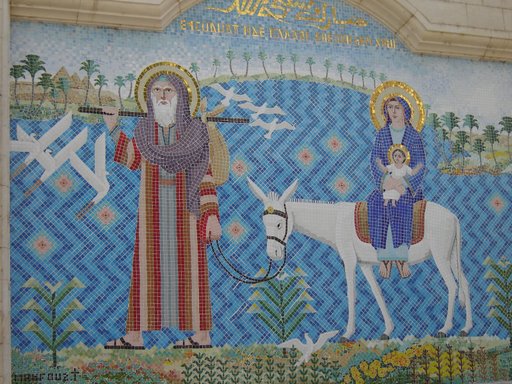 The Term "Copt" - The term "Copt" and "Egyptian" have the same meaning as derived from the Greek word aigyptos. With the suppression of the prefix, the suffix of the word, the stem "gypt" has become part of the words for "Egypt" and for "Copt" in all the modern languages of Latin origin. The Coptic Church then is simply the Egyptian Church.
The Term "Copt" - The term "Copt" and "Egyptian" have the same meaning as derived from the Greek word aigyptos. With the suppression of the prefix, the suffix of the word, the stem "gypt" has become part of the words for "Egypt" and for "Copt" in all the modern languages of Latin origin. The Coptic Church then is simply the Egyptian Church.
The Coptic Language - It is the last shape of the language of the ancient Egyptians. The earlier shapes represented in the Hieroglyphic and Hieratic and Demotic alphabet became inaccessible to the growing needs of daily life. After the spread of Christianity, Egyptian scholars trans-literated Egyptian texts into the Greek alphabet, and adopted the last seven additional letters of the Coptic alphabet from their own Demotic.
The Founders of the Church - The Copts pride themselves on the apostolicity of their national church, whose founder was none other than St. Mark, one of the four Evangelists and the writer of the oldest canonical Gospel. John Mark is regarded by the Coptic hierarchy as the first in their unbroken chain of 117 popes. He is also the first of a stream of Egyptian saints and glorious martyrs.
Church of Martyrs - After the martyrdom of St. Mark, the Coptic Church faced severe persecutions. The seventh persecution inflamed by emperor Diocletian; his reign (284-305) is considered by the Copts as the age of persecution. Under Maximin Daia (305-313), his successor in the East, the massacre continued for eight years of systematic killing. This could account for tremendous number of martyrs. So profound was the impression of the persecution of Diocletian on Coptic life and thought that the Copts decided to adopt for church use a calendar of the martyrs, the "Anno Martyri". The first year of that calendar was 284 A.D., the year of the disastrous accession of Diocletian.
Catechetical School of Alexandria - The school of Alexandria was undoubtedly the earliest important institution of theological learning in Christian antiquity. It was a college in which many other disciplines were studied from the humanities, science and mathematics; but its main discipline was religion. According to Eusebius, its founder was St. Mark who appointed Lustus as its dean, (later on, Lustus became the sixth patriarch). Most of the eminent leaders of Alexandria like Clement, Origen, Dionysius, Athanasius, Didymus the Blind and Cyril, were known to have been connected with it, either as teachers or students.
The Church of Monasticism - The Christian Church heavily indebted for the creation of monasticism which started in Egypt. Although St. Paul the Theban (died 340) is considered the first hermit, the origins of monasticism are ascribed to St. Anthony (251356) whose fame was spread by his famous biography written by St. Athanasius. The Fathers of the Church from numerous parts of the world came to Egypt for training in the way of monasticism. Monasticism has survived in Egypt and has given the Coptic Church an unbroken line of 117 Popes beginning with St. Mark. Although most of the monasteries have disappeared under the Arab persecution there is a revival in the surviving ones.
Adapted from "The Servants’ Manual" by Joseph Ibrahim

We believe in one God, God the Father the Pantocrator who created heaven and earth, and all things seen and unseen.
We believe in one Lord Jesus Christ, the Only-Begotten Son of God, begotten of the Father before all ages;

The Greatness of Alexandria
Alexandria was the cultural capital of the world when St. Mark arrived there. Its famous School was the centre of science and philosophy with a library filled with hundreds of thousands of books. The population of Alexandria was estimated to be from half to three quarters of a million,(1) who were Egyptians, Greeks, Jews, Romans, Ethiopians, Nubians and other races.
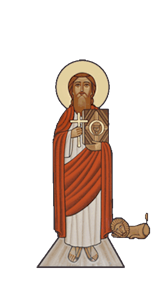 The Coptic Orthodox Church is an Apostolic Church, not only because her founder is St. Mark the Apostle who ministered in Egypt, ordained a bishop, priests, and deacons to aid him in his ministry and was martyred in Alexandria, and not only because her first Patriarch is St. Mark's successor through an unbroken chain of popes since the apostolic age, but also because she preserves the apostolic thought in her life, spirituality, liturgies and dogmas. She is actually a living extension of the apostolic church without deviation.
The Coptic Orthodox Church is an Apostolic Church, not only because her founder is St. Mark the Apostle who ministered in Egypt, ordained a bishop, priests, and deacons to aid him in his ministry and was martyred in Alexandria, and not only because her first Patriarch is St. Mark's successor through an unbroken chain of popes since the apostolic age, but also because she preserves the apostolic thought in her life, spirituality, liturgies and dogmas. She is actually a living extension of the apostolic church without deviation.
The Coptic Church is sometimes accused of exaggerated conservatism and refusal of concessions. As a matter of fact she is not stagnant or stolid but faithful and conservative, preserving the apostolic life, and desiring to offer the gift of faith in all its aspects throughout the ages.
![]() Coptic Church, Part II: Birth of the Church
Coptic Church, Part II: Birth of the Church
![]() Coptic Church, Part III: The Birth of the Church
Coptic Church, Part III: The Birth of the Church
![]() Coptic Church, Part IV: St Mark, the Apostle and Beholder of God
Coptic Church, Part IV: St Mark, the Apostle and Beholder of God



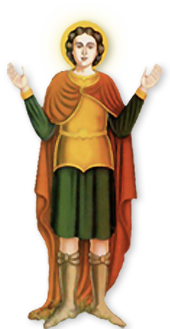





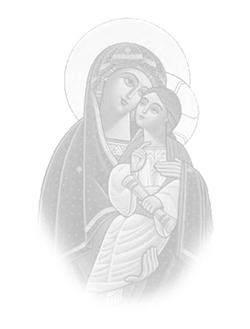



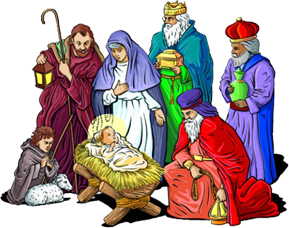

 Subscribe to RSS Feed
Subscribe to RSS Feed